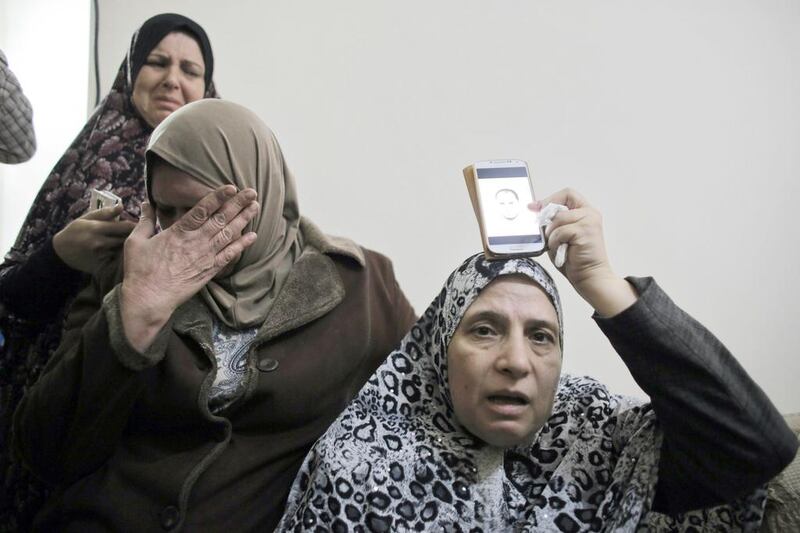JERUSALEM // Israeli police on Thursday raided the home of a Palestinian suspected of shooting of an Israeli rabbi and executed him on the roof, the man’s family claimed.
Mutaz Hijazi, 33, was shot after police stormed his home in the Abu Tor neighbourhood in East Jerusalem at 5.30am.
“He tried to run away and they dragged him to the rooftop and they killed him,” said Shayma Hijazi, 25, the victim’s sister. “I saw everything.”
Police said Hijazi opened fire at them and was pursued on to the roof, where he was shot and killed.
The shooting triggered fresh clashes in East Jerusalem, prompting Israel officials to close the Al Aqsa mosque compound, which is holy to Muslims and Jews. The compound was reopened hours later following Arab and US calls for Muslim worshippers to be allowed in.
However, entry for men for Friday midday prayers would be restricted to those over 50, a police spokeswoman said.
The Palestinian president, Mahmoud Abbas, had described the closure as tantamount to a “declaration of war”.
Tensions have been running high in Arab East Jerusalem since the kidnapping and murder of a Palestinian teenager from the area in July in apparent retaliation for the killing of three Israeli teenagers the month before.
They escalated last week after a car driven by a Palestinian man ploughed into commuters standing by the side of the road, killing a Jewish woman and child.
Israel called the incident a terrorist attack, but the family of the driver, who was shot dead by police immediately afterwards, denied this.
On Monday, the Israeli government revealed plans to build 1,000 new settler homes in East Jerusalem, which Palestinians consider to be the capital of their future independent state.
Yesterday’s raid on Hijazi’s home came hours after a right-wing rabbi, Yehuda Glick, was shot outside the Menachem Begin Centre in Jerusalem on Wednesday night. He had attended a conference of Israeli activists seeking the right for Jews to pray on the grounds of the Al Aqsa mosque, a site the Jewish population refers to as Temple Mount.
Mr Glick was reported to be in critical condition in a Jerusalem hospital.
Neighbours and family members shouted “Allahu Akbar” as an ambulance finally took Hijazi’s body away to a police station. Police fired rubber bullets, stun grenades and tear gas to disperse the crowd.
Police also arrested Hijazi’s brother, Adi, and his father, Ibrahim, who works as a guard at the Unicef office in Beit Hanina.
Ibrahim Hijazi had been out of town but arrived home at around 6.45am after his son said police had surrounded the area.
“I parked my car down the hill and the army prevented me from coming into my house,” he said after being released. “I was held for questioning until 2.30 this afternoon and was not told until later that my son was dead.”
Women gathered on the first floor of the Hijazi home outside Mutaz’s bedroom, wailing and shocked.
Israeli police said they found the motorbike they believed was used in the attack on Mr Glick near Hijazi’s house.
“This morning a number of police units entered the Abu Tor area with the intention to arrest the suspect,” said Micky Rosenfeld, an Israeli police spokesman.
“He opened fire on officers and they shot and killed him.”
However, relatives and neighbours of Hijazi said police ordered people to stay inside their homes and used force against those who tried to witness the raid.
Hijazi’s aunt, Taghreed Abu Isneineh, said she was awake at 5.30am and saw the shooting from her kitchen window. “The soldiers aimed their guns at me and told me close the window,” she said.
She said she then went outside to see what was happening.
“Other people were trying go inside the Hijazi house. The soldiers pulled me away and beat me on my stomach.”
Raed Ilian, a pharmacist living in Abu Tor, said he was woken by gunshots. He said police tried to stop people from leaving their houses as gun shots continued.
“They fired rubber bullets and tear gas,” he said.
His neighbour Madhi Burkan, 33, a construction worker, hobbled to Mr Ilian’s front door and lifted his singlet to show a red welt on his side where he had been hit by a rubber bullet as he tried to leave the house.
“I opened the door and the rubber bullet hit my friend in his side,” Mr Ilian said.
“After the shooting they were firing rubber bullets at anyone who tried to come outside.”
He said at least 200 policemen had entered the neighbourhood.
During the gunfire, a mosque loudspeaker rang out with a prayer for the dead: “Please pray for the martyr Mutaz Hijazi. We belong to God, and to him we will return.”
foreign.desk@thenational.ae
* With additional reporting from Agence France-Presse





